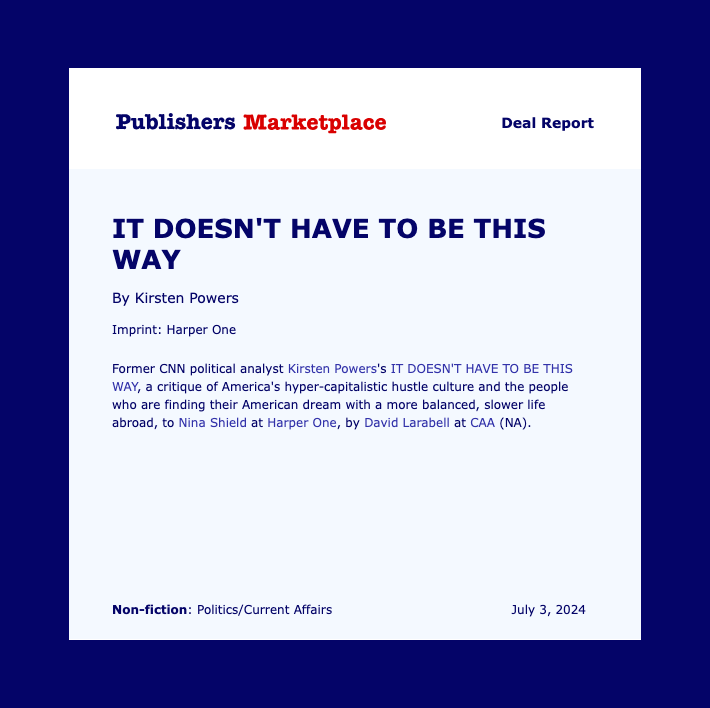I'm Writing Another Book: 'It Doesn't Have to Be This Way'
Based on the viral essay 'How We Live in the US is Not Normal' my upcoming book examines the toll of hyper-capitalism on Americans' lives and what we can do about it
I am thrilled to announce that Harper One acquired my book, 'It Doesn't Have to Be This Way,' based on the viral essay, "How We Live in America is Not Normal."
I can't say why it's taken me so long to share this news about the book, since I signed the contract last summer. Perhaps I can blame it on my slower living in Italy. Things feel less urgent, but I have wanted to share this news because I know that essays and other posts about the plague of late-stage capitalism brought many of you here.
In this book I'll be examining the huge toll late-stage capitalism has taken on American life and the many lessons we can learn from other countries on how to live differently. I'll also delve into what we can learn from looking at the United States' not-so-distant past when capitalism existed within certain guardrails and our system looked more like our peer countries in terms of social support.
To be clear, this is not a call to arms to leave the United States. Most people can't do that, or don't want to do that. For those who do want to leave, they may find inspiration in my story and the stories of other people who have relocated to new countries.
However, the overarching point of sharing these stories is to demonstrate that the systems of countries have a direct impact on your basic quality of life. For example, many people who were suffering from chronic illness, depression, and anxiety found that those things disappeared when they moved to a place where they weren't required to work constantly just to afford the basics of life. They felt better because they were able to live near nature or had more time to connect with the community, for example.
But you give up a lot when you move away from your home, and the fact is none of us should have to do that considering the United States has more resources than any country in existence. No American should feel that the only way to have a balanced life it to move to another country.
Yet, many do.
This book is personal to me because I nearly destroyed my mental and physical health in the pursuit of professional success and financial security before I woke up to the fact that the US economic system has turned into what feels like a massive scam.
It demands you work constantly, not just for money, but also for your identity, and then, when your body can't handle it, sells you "solutions" that are band-aids at best. Whatever the problem is, the solution is always us buying something with money we don't have, rather than the system changing. Every problem is treated like an individual issue that can be solved with more discipline or a ‘life hack.’
The fact is, hyper-capitalism has destroyed quality of life for the vast majority of Americans, because affording the basic necessities of life has become an impossible burden to bear.
But what’s even worse it that this system has colonized our minds and made so many of us think that the entire purpose of life is to work, acquire, grow, and build and that if we aren’t doing that something is wrong with us.
It’s made us think that this is just the way life is and nothing can be done about it.
But we aren't the problem, and it doesn’t have to be this way.
While most industrialized countries manage to provide health care, education, regular working hours—you know, the basic things people need—to it's citizens, we are asked to believe that it just beyond the capacity of the United States of America to do this even though the government provided these things just a few generations ago.
It’s not just that there is basic support in many of the US’s peer countries. There is a vastly different understanding of what the purpose of life is and what is important. It actually isn’t that different than what I experienced terms of values when I was growing up in the 1970s and early 1980s.
But somewhere the US (and it seems, some other English speaking capitalist countries) diverged and went down a starkly different path.



